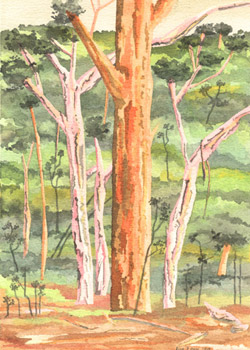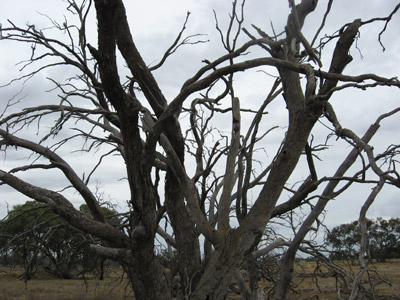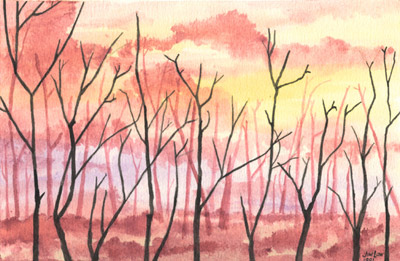TREES

I like trees. I am pretty sure I always have. From my earliest childhood memories playing in the dirt under a very large tree in the back corner of a very large yard, I have sensed their importance to me. From an early age, I have lamented the loss of trees, like the large, old Morton Bay Fig that stood in the way of the Warringah Expressway.
I have drawn and painted pictures of trees, photographed them, written songs and poems about them, even given a fair few a loving caress.
Each evening as I sit down to tea, I look out the back window across a bushland valley smothered with trees. I have seen many of the trees in my backyard and beyond suffer the consequences of fire. I have also watched in wonder their resilient capacity to regenerate.
A couple of weeks ago I travelled south through New South Wales into western Victoria. Many of the places visited have been in drought for over a decade.
Approaching the border I passed close by the Barmah-Millewa forest which is on the floodplain, bordering both sides of the Murray River above Echuca. Next time I hope to visit Joe Murphy whose concern for many years has been the effects on the river and its surrounds because of the changes that have occurred through people’s demands on the river water.
Of particular concern is the damage caused to the river red gum forest. These trees require an annual 1200mm of water. In the past this has been achieved through rainfall, plus the annual winter and spring flooding of the river. Weirs and dams, built to control the river's waters and the removal of water for irrigation purposes, have seen the red gum forest start to die. Too much water can drown the red gums; too little water can starve them. This delicate natural balance has been disturbed. Back in 1992 I wrote a song about Joe Murphy and this precious river red gum forest.
 For this forest of our nation
For this forest of our nation
Needs water for regeneration
It's good to know there are people who still care.
The chorus goes:
But while there's life
There's always hope
Or so the saying goes
And through the years
It's this hope Joe Murphy knows.
I cannot remember ever seeing so many dead trees. Just west of the Victorian township of Charlton I passed a property which had funding to try and reduce the saline ground water by growing seaweed in ponds. Around this area I stopped to examine the soil. It was just like powder and much had been blown from the paddocks onto the roadside and far beyond.
On my travels I picked up a modest, little anthology of poems by H. S. Legge entitled On the Edge of the Bush. The collection’s title attracted me to it straightaway since it described where I live. A first edition published in 1925, Legge obviously valued trees very highly. Of some old gum-trees he playfully wrote:
They throw out their branches so easy and free
You can strike up a friendship with that sort of tree.
 About half of the poems in Legge’s collection are about birds, the “casual callers” on these trees. We are aptly reminded of the “clear rich mellow cheerful notes” of the magpie as it “pipes” in autumn. The magpie for me will always be the voice of morning. In another poem our attention is drawn to the ever active Willie Wagtail, “a dapper little gentleman”, whose “tail is always wagging / with an energy unflagging”. We meet the kookaburra as he tries his “rusty throat” to produce an initial “discordant laugh, explosive, / demoniacal, corrosive”. I was not sure of the suitability of the adjective “demonical” until a few days ago when I was working in the bushland on my property. I was startled by a rather sinister sound that originated from none other than a kookaburra, practising his laughter in a tree nearby.
About half of the poems in Legge’s collection are about birds, the “casual callers” on these trees. We are aptly reminded of the “clear rich mellow cheerful notes” of the magpie as it “pipes” in autumn. The magpie for me will always be the voice of morning. In another poem our attention is drawn to the ever active Willie Wagtail, “a dapper little gentleman”, whose “tail is always wagging / with an energy unflagging”. We meet the kookaburra as he tries his “rusty throat” to produce an initial “discordant laugh, explosive, / demoniacal, corrosive”. I was not sure of the suitability of the adjective “demonical” until a few days ago when I was working in the bushland on my property. I was startled by a rather sinister sound that originated from none other than a kookaburra, practising his laughter in a tree nearby.
Without trees there would be none of these wonderful birds to give us so much pleasure. I hope some worthwhile rain comes soon to the farming districts I visited. They surely need it. And so do the trees out there.
In Drought
Clumps of trees
In pale, parched paddocks,
Leaf and life less
In death.
Their chalk-grey limbs
Like skeletons
Gesturing to the sky,
Beseeching powers on high
As if recalling
Some vague memory of rain.
©Jim Low 2009
